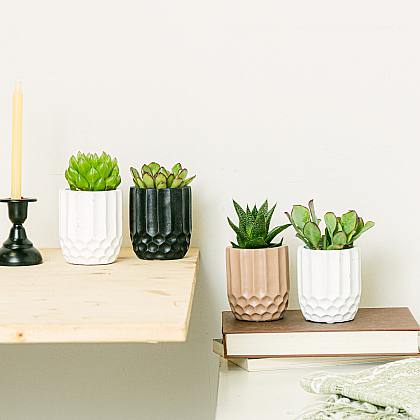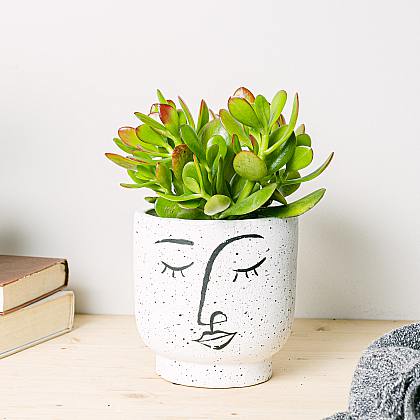Find the perfect place for your plants according to feng shui: useful tips
Feng Shui is an ancient Chinese practice that seeks to harmonize the energy of spaces to promote health and well-being. In this article, we will discover how to find the ideal place for our plants using the principles of Feng Shui
Feng Shui is an ancient Chinese practice that seeks to harmonize the energy of spaces to promote health and well-being. In this article, we will discover how to find the ideal place for our plants using the principles of Feng Shui. Plants play a fundamental role in this practice, as they not only add beauty to our home, but also purify the air and improve the energy of spaces. We will learn about the importance of the right location for each type of plant, recommendations according to Feng Shui, as well as tips to keep our plants healthy and happy. We will also explore how to harmonize the energy of our home with the right plants, the power of color in plants according to Feng Shui and how to combine them with other decorative elements to achieve a perfect balance.
Feng Shui and the importance of plants in the home
Feng Shui is a philosophy that seeks to harmonize the environment in which we live, in order to achieve a greater sense of well-being and balance. Within this current, plants occupy a prominent place, as they are considered as living elements capable of purifying and balancing the energy of spaces. Therefore, it is important to carefully choose the plants that we place in our home and place them in strategic places according to their characteristics and needs. In addition, Feng Shui teaches us to pay attention to the way plants interact with other decorative elements, such as furniture, paintings or lamps, to create a harmonious and balanced atmosphere. Plants can also help us reduce stress, improve air quality, and increase our creativity and productivity. In short, incorporating plants into our home following the principles of Feng Shui can be an excellent way to improve our quality of life and create a harmonious and healthy space for us and our family.
The perfect location for every type of plant
Each type of plant has specific needs to grow and develop properly. Therefore, finding the perfect location for each of them is critical to ensuring your health and well-being. Generally speaking, plants that require a lot of sunlight should be placed near south- or east-facing windows. Plants that prefer shade, on the other hand, should be placed in darker areas of the house, such as nooks and crannies or rooms with little natural light. In addition, it is important to take into account the temperature and humidity of the environment. Tropical plants need a warm, moist environment, while desert plants prefer drier, warmer climates. Flowering plants, such as orchids, need an adequate amount of sunlight but should not be exposed to direct light throughout the day. In short, it is essential to know the specific needs of each plant and adapt its location accordingly. If you keep this in mind, you can create a healthy and balanced environment for plants in the home and enjoy their beauty for a long time.
Recommended plants according to Feng Shui
According to Feng Shui, there are certain plants that are more recommended than others to attract positive energy into the home. One of them is the bamboo plant, which symbolizes prosperity and good luck. It is said that the more stems the plant has, the greater its power to attract wealth and abundance. Another very popular plant in Feng Shui is the money tree, also known as Pachira. This plant is believed to attract prosperity and wealth, especially when placed in the left corner of the room. The jade plant is another popular choice because of its beautiful appearance and healing properties. It is said that this plant can help calm the nerves and bring harmony into the home. Plus, it's an easy plant to care for, making it perfect for those who don't have much experience with plants. Other plants recommended according to Feng Shui include cactus, which is believed to protect against negative energy, and lavender, which helps promote a relaxing and tranquil environment. In general, Feng Shui recommends choosing plants with rounded, smooth leaves rather than spiky or prickly leaves, as the former are considered more harmonious and balanced.
Tips to Keep Your Plants Healthy and Happy
Keeping plants healthy and happy is no easy task, but with a few helpful tips, it can be accomplished. First of all, it is important to choose the right type of plant for the space in which it will be placed. Each plant has different needs for light, water, and temperature, so it's essential to know them in order to provide them with an optimal environment. In addition, it is necessary to water the plants regularly and in the right amount, avoiding both over- and underwatering. It is also important to provide them with sufficient nutrients through organic fertilizers or special plant fertilizers. Another important factor to consider is the ventilation of the space where the plants are located, as good air circulation helps prevent diseases and pests. Finally, it is advisable to check the plants periodically for signs of disease or pest infestation and act quickly to fix any problems. By following these tips, your plants will be healthy and happy in their home.
How to Harmonize Your Home's Energy with the Right Plants
How to Harmonize Your Home's Energy with the Right Plants
Harmonizing the energy of your home is essential to creating a balanced and positive environment. Feng Shui teaches us that plants can be powerful allies in this process. To achieve this, it is important to choose the right plants and place them strategically in different areas of the house.
First of all, it is essential to consider the specific needs of each plant. Some require more sunlight, while others prefer more shaded spaces. In addition, we need to consider the size of the plant and make sure that it has enough room to grow and develop.
According to Feng Shui, certain plants are especially beneficial for harmonizing the energy of the home. For example, lucky bamboo is believed to attract prosperity and good fortune, while peace lily helps purify the air and promote harmony. Other recommended options include lavender, which promotes relaxation, and jasmine, which provides calming energy.
In addition to choosing the right plants, it's important to care for them correctly to maintain their vitality. This includes watering them regularly, providing them with enough light, and nourishing the soil with natural fertilizers.
In short, harmonizing your home's energy with the right plants can have a significant impact on your well-being and the overall ambiance of your living space. Carefully choose the plants that best suit your needs and place them strategically to create a harmonious flow of energy in your home.
The power of color in plants according to Feng Shui
The power of color in plants according to Feng Shui is a key aspect to take into account when decorating our home. According to this ancient Chinese practice, each color has a specific meaning and energy that can influence our well-being and balance. In the case of plants, the color of their flowers or foliage can further enhance this positive influence on our environment. For example, the color red is associated with passion and vitality, so plants with red flowers are ideal for areas where you are looking to increase energy and activity, such as the living room or kitchen. On the other hand, the color green represents calm and harmony, so plants with green foliage are perfect for relaxation spaces such as the bedroom or study. Yellow symbolizes joy and communication, so plants with yellow flowers are ideal for social areas such as the dining room or living room. It is important to keep these meanings in mind when choosing plants and placing them strategically in our home, as they will help us create a balanced and harmonious environment according to the principles of Feng Shui.
The Perfect Balance: Combining Plants with Other Decorative Elements
When it comes to decorating with plants, it is important to consider the combination with other decorative elements to achieve a perfect balance. Plants can be the focal point of a room, but they can also complement other elements such as furniture, textiles, and decorative objects. For example, hanging plants can be a great option to fill empty spaces on the wall and create a more welcoming atmosphere. In addition, planters and vases can be used as decorative elements by themselves, adding texture and color to the room. It's important to choose planters that match the overall style of the room for a cohesive look. Another aspect to consider is the size of the plants and how they relate to the available space. Large plants can be stunning, but if not placed properly they can make a room look cluttered. Therefore, it is important to play with different heights and sizes of plants to create a balanced effect. Finally, it's important to remember that plants shouldn't dominate the room. While they are an important element in home décor, they should also be combined with other elements to achieve a balanced and harmonious environment.
Finding the ideal place for our plants with Feng Shui is a practice that can provide us with both aesthetic and energetic benefits in our home. The balance and harmony that we can achieve by combining plants with other decorative elements allow us to create a space full of life and vitality. Additionally, by knowing the perfect location for each type of plant and following tips to keep them healthy and happy, we can ensure that they are getting the right energy for their growth and development. Likewise, the power of color in plants according to Feng Shui invites us to explore new combinations and experiment with different shades to further enhance the positive energy in our home. However, it is important to remember that each person has their own preferences and tastes, so it is necessary to adapt these recommendations to our individual needs. Ultimately, finding the ideal place for our plants is an ongoing process of exploration and discovery, which allows us to connect with nature and create a welcoming and harmonious environment in our home


